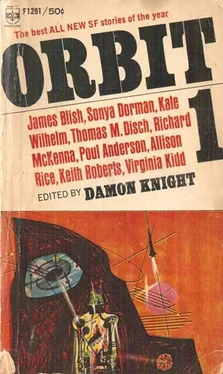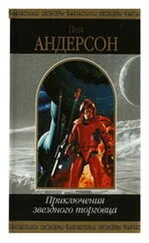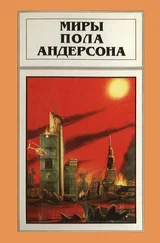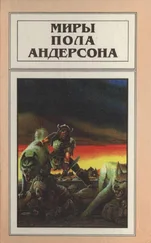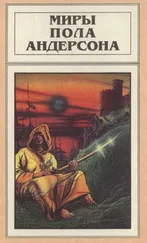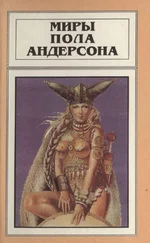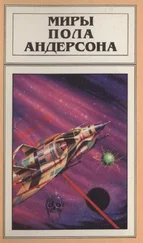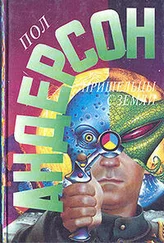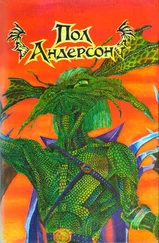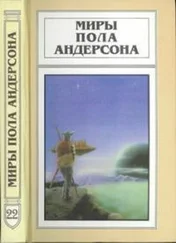Пол Андерсон - Orbit 1
Здесь есть возможность читать онлайн «Пол Андерсон - Orbit 1» весь текст электронной книги совершенно бесплатно (целиком полную версию без сокращений). В некоторых случаях можно слушать аудио, скачать через торрент в формате fb2 и присутствует краткое содержание. Год выпуска: 1966, Жанр: Фантастика и фэнтези, на английском языке. Описание произведения, (предисловие) а так же отзывы посетителей доступны на портале библиотеки ЛибКат.
- Название:Orbit 1
- Автор:
- Жанр:
- Год:1966
- ISBN:нет данных
- Рейтинг книги:4 / 5. Голосов: 1
-
Избранное:Добавить в избранное
- Отзывы:
-
Ваша оценка:
- 80
- 1
- 2
- 3
- 4
- 5
Orbit 1: краткое содержание, описание и аннотация
Предлагаем к чтению аннотацию, описание, краткое содержание или предисловие (зависит от того, что написал сам автор книги «Orbit 1»). Если вы не нашли необходимую информацию о книге — напишите в комментариях, мы постараемся отыскать её.
Orbit 1 — читать онлайн бесплатно полную книгу (весь текст) целиком
Ниже представлен текст книги, разбитый по страницам. Система сохранения места последней прочитанной страницы, позволяет с удобством читать онлайн бесплатно книгу «Orbit 1», без необходимости каждый раз заново искать на чём Вы остановились. Поставьте закладку, и сможете в любой момент перейти на страницу, на которой закончили чтение.
Интервал:
Закладка:
“In your book, the one I tried to read, you said that people and animals can’t be bred together if they’ve evolved a long way apart.”
“It’s true.”
“What is truth? Something always the same, everywhere, all the time?”
“Truth is something like that.”
“Then it isn’t true. What if things evolve together, toward each other?”
He had laughed then and told her she would never be a scientist. Things cannot evolve toward each other. They cannot.
But now that his only tangible link to Nyctimene was the basket of unhatched eggs, he hoped she had spoken truly. The month of their incubation would be a torture of suspense. Thirty days — it was half as long as the eternity they had been together.
Mrs. Shreve found him in Nyctimene’s room and led him downstairs. Some guests had departed; the others had only been waiting his return to say their goodbys. Mrs. Shreve was very brusque and full of business, insisting that he finish the galleys a week before it was possible. She meant it as a kindness.
Nyctimene had never been kind to him. Often, like a goddess, like an animal, she had been deliberately cruel, mocking him at the most indelicate moments or pinching him with her taloned fingers when she thought him inattentive. However, he was rarely inattentive. Cruelty? At times he had thought of the shrike, impaling her mate on her voluptuous beak, but predator though Nyctimene might be, murderess she was not.
Alone, again, he began to clear the living room of the dirty dishes, the smeared glasses, the ashtrays. Alone again, he thought…
Of Nyctimene. She had filled his larger loneliness. She had taught him satiety. As a young man he had indeed sparred with women, but he had never loved nor as far as he knew been loved. Now, thrust back again into that loneliness, he wondered if he could return to his old shifts. To his studies. The grotto might have lost its magic.
Yet it was not so bleak a prospect nor so final a rupture. Her image would not blur with years or distance, of that he could be sure. And there was still. . their children. Fondly now, anxiety quite drained away (and a little drunk), he took up the little basket she had left.
It was empty.
He behaved quite rationally. He looked in all the likely places before he searched the unlikely places. There were no eggs in the refrigerator, in the cupboards, in the grocery bags.
He found the shells in the garbage.
Ursa had gone to see her mother as she always did Thursday evenings. But in any case he did not need to question her. For the recipe was in plain sight on the kitchen table. It was hand-lettered on a 3 x 5 card:
CAESAR SALAD
Romaine lettuce Vinegar
5 cloves garlic 5 eggs
10 anchovies Salt, pepper
12 tbsp. Parmesan cheese Croutons, fried in butter till brown
Olive oil
Rub wooden salad bowl with garlic. Mash anchovies into paste, add cheese. Add eggs, well beaten. Add oil, continue beating. Add salt, pepper, vinegar. Toss romaine leaves until well coated with dressing. Add croutons. Serve. Eat.
He should have been quite upset. Instead, despair sifted down on him like snow covering the leaves that would be humus in the spring. He wondered: Had she known?
He wondered not of Ursa. Ursa’s malice was more direct and pettier. In any case, Ursa did not know what the eggs were.
He wondered if this had not been the last and subtlest of Nyctimene’s cruelties. He doubted (because he wanted not to believe) that they had been his children, that they had been any other than the most ordinary eggs. But he remembered Nyctimene’s savage hilarity when he had read the disgusting scene in Titus Andronicus, when Titus serves the Queen her own sons in a stew. And he recognized the handwriting on the 3x5 card: it was hers.
KEITH ROBERTS is a young English commercial artist who turned to writing science fiction two years ago, with spectacular results. His first novel, The Furies, was published by Berkley in 1966.
“The Deeps” is remarkable for its grasp of the subject, its plausible treatment of women — rare in men’s writing — and for the sea music that mumbles and moans its way through the story.
THE DEEPS
By Keith Roberts
It was bound to happen. For generations, the chain reaction of population explosion had been going on and on. While medical skill grew, while longevity increased nearly beyond belief, humankind everywhere bred and bred and bred. Houses, estates, factories to serve the vast new economies spread and sprawled, twitching out across good land and bad, climbing mountains, suffocating rivers. Town touched town, touched town; the pink octopus tentacles of houses grew and thickened as the machines graded and scraped and hammered. Green belts and parks vanished, fields were swallowed overnight. Here and there voices were raised; the voices of economists, scientists, philosophers, even at last theologians. But they were swamped in the great universal cry.
Give us room. . The shout went up night and day from a hundred million throats, the slogan blared from loudspeakers, blazed from hoardings as political parties jockeyed for power. Increasingly, room was what they promised. Room for more houses, more estates, room to rear new families that cried in their turn for room and still more room…
All over the world countrysides vanished, eaten. Wars flared as nations bit at each other’s borders, but still the Cities grew. The huge estates were searched, forced to yield their last acres, their secret gardens. And all for nothing, it seemed, because still the cry was heard for room. Skyscrapers soared, fifty stories, seventy, a hundred, and it was not enough. The Cities bulged outward, noisy with music and the sound of human life. A hundred yards thick they were and blaring with light, complex with stack on twinkling stack of avenues. Raucous, Techni-colored, sleepless. Everywhere, they reached the sea.
And they could not stop. The pressure, the need for room, pushed them out again. The houses sank like silver bells into blueness and quiet, and at last there was room enough.
Mary Franklin sat in the living area of her bungalow, knitting quiet for once in her lap, and tried to watch the telscreen at the other side of the room. Across her line of sight Jen passed scuttling, bare feet scuffing the carpet, the straps of her lung flapping round her shoulders. Across and back, then across again, frantic now, going to a party at the Belmonts on the other side of town, and late. Mary raised her eyes to Heaven, represented temporarily by a curved steel shell. She concentrated on the screen where a demonstrator, in a vivid color, divulged to her audience the inner secrets of a varient of crawfish mayonnaise. Jen yelped something inaudible from the bedroom, thumped the wall. (Why. .?) She padded across again and back. Mary raised her voice suddenly.
“Jen…?”
Thump. Mumble.
“Jen!”
“Mummy, I can’t find my. .” Indistinguishable.
“Jen, you’re not to be late. No more than nine, understand?”
“Yes…”
“And for land’s sake child, put something on. .”
“Yes, Mummy. .” That in a high voice, wearily. And almost instantly the roar of the sealock. Mary got up in quick rage, walked halfway to the radio gear, changed her mind, went back to her chair. Jen, she knew well enough, would conveniently have forgotten her phone-leads.
She kicked the channel switch irritably in passing; the picture on the wallscreen jumped and altered. The set began to disgorge a Western; Mary lay back, eyes nearly shut, half her mind on the ancient film and half on the blueness overhead. The endless blue.
Читать дальшеИнтервал:
Закладка:
Похожие книги на «Orbit 1»
Представляем Вашему вниманию похожие книги на «Orbit 1» списком для выбора. Мы отобрали схожую по названию и смыслу литературу в надежде предоставить читателям больше вариантов отыскать новые, интересные, ещё непрочитанные произведения.
Обсуждение, отзывы о книге «Orbit 1» и просто собственные мнения читателей. Оставьте ваши комментарии, напишите, что Вы думаете о произведении, его смысле или главных героях. Укажите что конкретно понравилось, а что нет, и почему Вы так считаете.
